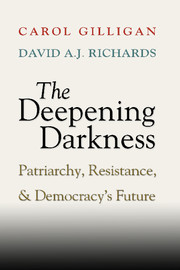
-
Select format
-
- Publisher:
- Cambridge University Press
- Publication date:
- 01 September 2010
- 10 November 2008
- ISBN:
- 9780511552045
- 9780521898980
- 9781107672338
- Dimensions:
- (234 x 156 mm)
- Weight & Pages:
- 0.72kg, 352 Pages
- Dimensions:
- (234 x 156 mm)
- Weight & Pages:
- 0.54kg, 352 Pages
- Subjects:
- Philosophy, Political Philosophy
You may already have access via personal or institutional login- Subjects:
- Philosophy, Political Philosophy
Book description
Why is America again unjustly at war? Why is its politics distorted by wedge issues like abortion and gay marriage? Why is anti-Semitism still so powerfully resurgent? Such contradictions within democracies arise from a patriarchal psychology still alive in our personal and political lives in tension with the equal voice that is the basis of democracy. This book joins a psychological approach with a political-theoretical one that traces both this psychology (based on loss in intimate life) and resistance to it (based on the love of equals) to the Roman Republic and Empire and to three Latin masterpieces: Virgil's Aeneid, Apuleius's The Golden Ass, and Augustine's Confessions. In addition, this book explains many other aspects of our present situation including why movements of ethical resistance are often accompanied by a freeing of sexuality and why we are witnessing an aggressive fundamentalism at home and abroad.
Reviews
“The Deepening Darkness leads to the light of understanding that there can be no true democracy in public life until we have democratic families and connections in private life. Gilligan and Richards have proven this link. Now it's up to us to live it.”
Gloria Steinem
“This is a book with a grand thesis, and it should probably be thought of in the tradition of Hannah Arendt on evil, or Bruno Bettelheim. It argues that patriarchy remains the root of the evils of racism, sexism and much violence in contemporary society. More precisely, the book claims that patriarchy calls for and legitimates the traumatic disruption of intimate relationships, and the effect of such trauma in the human psyche is precisely to suppress personal voice and relationships and to identify with the patriarchal voice that imposed the disruption.”
Simon Goldhill, Professor of Classics, Kings College, University of Cambridge
“This historically probing, gracefully literary, and deliciously detailed book brilliantly illuminates the mysterious psychological roots of political domination and defiance.”
Stephen Holmes, Walter E. Meyer Professor of Law, NYU School of Law
“Far-ranging in its scope, compelling in its exposition and argument, informed by an inclusive, humane vision and imagination, this ambitious, richly perceptive synoptic study is firmly anchored in the insights and findings of recent scholarship. It brilliantly connects the ancient Roman world with our own. It illuminates as it forges other, riveting connections among a dazzling array of ostensibly disparate topics concerning contemporary Americans, and accords center stage to the role played by a series of canonized western literary masterpieces in making and sustaining these connections.”
Judith P. Hallett, Professor, Department of Classics, University of Maryland
“Carol Gilligan and David Richards have written a bold book that draws as palpably on their respective backgrounds in psychology and law as it does on their shared passion for literature. Using an immensely rich set of materials, they explore how patriarchy operates at the atomic level of human consciousness, and how, in doing so, it can destroy even its ostensible beneficiaries. These scholars see the world differently from you, and the book they have written may trigger a welcome conversion.”
Kenji Yoshino, Chief Justice Earl Warren Professor of Constitutional Law, NYU School of Law
“The Deepening Darkness is that rare thing – a cultural study that is not only a delight to read, but one with important practical implications. Gilligan and Richards expose the fundamental organizing role of patriarchy in western consciousness and show that we have been wedded to a false story about human nature, resistance to which is understood as pathology or sin. They provide fascinating descriptions of the error being transmitted through social institutions, and point out its malignant impact on men and women alike. For example, they trace clearly how even psychoanalysis, which began by liberating the individual, became oppressive due to Freud's inability to escape the patriarchical demands embedded in his own psychology.”
Owen Renik, former Editor-in-Chief of The Psychoanalytic Quarterly
Contents
Metrics
Altmetric attention score
Full text views
Full text views help Loading metrics...
Loading metrics...
* Views captured on Cambridge Core between #date#. This data will be updated every 24 hours.
Usage data cannot currently be displayed.
Accessibility standard: Unknown
Why this information is here
This section outlines the accessibility features of this content - including support for screen readers, full keyboard navigation and high-contrast display options. This may not be relevant for you.
Accessibility Information
Accessibility compliance for the PDF of this book is currently unknown and may be updated in the future.


